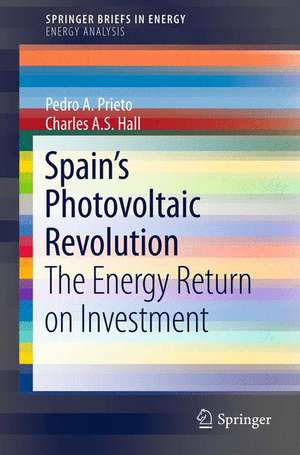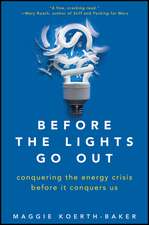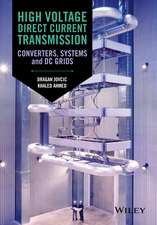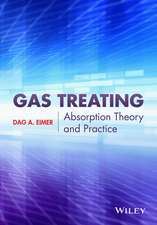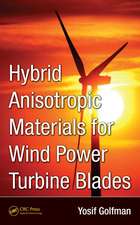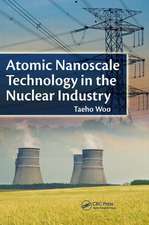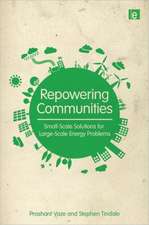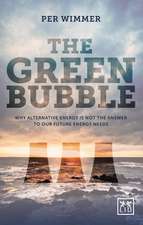Spain’s Photovoltaic Revolution: The Energy Return on Investment: SpringerBriefs in Energy
Autor Pedro A. Prieto, Charles A. S. Hallen Limba Engleză Paperback – 3 ian 2013
Sunny Spain represented an ideal case study as the country had the highest penetration of solar PV energyat 2.3 percent of total national demand as well as state-of-the-art expertise in solar power including grid management of intermittent, modern renewable systems. This book, written by a uniquely qualified author team consisting of the chief engineer for several major photovoltaic projects in Spain and the world’s leading expert on the concept and application of EROI, provides a comprehensive understanding of the net energy available to society from energy sources in general and from functioning PV installations under real-world conditions in particular. The authors provide critical insight into the capacity of renewable energy sources to fill the foreseeable gap between world energy demand and depletion rates for fossil fuels.
· Presents the first comprehensive study of the EROI of large-scale solar PV systems in a developed country
· Uses real-world operational data rather than laboratory approximations and extrapolations
· Describes the dependence of one alternative energy source on the goods and services of a fossil-fueled economy
· Has global implications for the potential of renewable energy sources to replace dwindling reserves of fossil fuels
· Written with the first-hand knowledge of the chief, on-site engineer for many solar installations in Spain together with the leader in the development and application of the concept of EROI
Din seria SpringerBriefs in Energy
-
 Preț: 345.89 lei
Preț: 345.89 lei -
 Preț: 345.89 lei
Preț: 345.89 lei -
 Preț: 376.04 lei
Preț: 376.04 lei -
 Preț: 377.35 lei
Preț: 377.35 lei -
 Preț: 476.42 lei
Preț: 476.42 lei -
 Preț: 343.36 lei
Preț: 343.36 lei -
 Preț: 374.85 lei
Preț: 374.85 lei -
 Preț: 376.59 lei
Preț: 376.59 lei -
 Preț: 477.72 lei
Preț: 477.72 lei -
 Preț: 176.35 lei
Preț: 176.35 lei -
 Preț: 380.07 lei
Preț: 380.07 lei -
 Preț: 376.22 lei
Preț: 376.22 lei -
 Preț: 377.95 lei
Preț: 377.95 lei -
 Preț: 376.43 lei
Preț: 376.43 lei -
 Preț: 377.73 lei
Preț: 377.73 lei -
 Preț: 343.00 lei
Preț: 343.00 lei -
 Preț: 377.35 lei
Preț: 377.35 lei -
 Preț: 377.95 lei
Preț: 377.95 lei -
 Preț: 444.35 lei
Preț: 444.35 lei -
 Preț: 348.83 lei
Preț: 348.83 lei -
 Preț: 412.30 lei
Preț: 412.30 lei -
 Preț: 377.73 lei
Preț: 377.73 lei -
 Preț: 375.62 lei
Preț: 375.62 lei -
 Preț: 380.07 lei
Preț: 380.07 lei -
 Preț: 376.80 lei
Preț: 376.80 lei -
 Preț: 376.22 lei
Preț: 376.22 lei -
 Preț: 479.67 lei
Preț: 479.67 lei - 15%
 Preț: 463.85 lei
Preț: 463.85 lei -
 Preț: 476.79 lei
Preț: 476.79 lei -
 Preț: 375.23 lei
Preț: 375.23 lei -
 Preț: 379.09 lei
Preț: 379.09 lei -
 Preț: 376.22 lei
Preț: 376.22 lei -
 Preț: 409.43 lei
Preț: 409.43 lei - 15%
 Preț: 462.38 lei
Preț: 462.38 lei -
 Preț: 414.21 lei
Preț: 414.21 lei -
 Preț: 375.62 lei
Preț: 375.62 lei -
 Preț: 374.30 lei
Preț: 374.30 lei -
 Preț: 376.22 lei
Preț: 376.22 lei - 15%
 Preț: 463.35 lei
Preț: 463.35 lei -
 Preț: 381.71 lei
Preț: 381.71 lei -
 Preț: 379.09 lei
Preț: 379.09 lei -
 Preț: 375.62 lei
Preț: 375.62 lei - 15%
 Preț: 463.35 lei
Preț: 463.35 lei -
 Preț: 376.80 lei
Preț: 376.80 lei -
 Preț: 374.46 lei
Preț: 374.46 lei -
 Preț: 477.56 lei
Preț: 477.56 lei -
 Preț: 379.48 lei
Preț: 379.48 lei -
 Preț: 374.30 lei
Preț: 374.30 lei -
 Preț: 378.12 lei
Preț: 378.12 lei
Preț: 479.47 lei
Nou
Puncte Express: 719
Preț estimativ în valută:
91.74€ • 95.79$ • 75.93£
91.74€ • 95.79$ • 75.93£
Carte tipărită la comandă
Livrare economică 05-19 aprilie
Preluare comenzi: 021 569.72.76
Specificații
ISBN-13: 9781441994363
ISBN-10: 144199436X
Pagini: 148
Ilustrații: XX, 128 p. 18 illus. in color.
Dimensiuni: 155 x 235 x 8 mm
Greutate: 0.22 kg
Ediția:2013
Editura: Springer
Colecția Springer
Seriile SpringerBriefs in Energy, Energy Analysis
Locul publicării:New York, NY, United States
ISBN-10: 144199436X
Pagini: 148
Ilustrații: XX, 128 p. 18 illus. in color.
Dimensiuni: 155 x 235 x 8 mm
Greutate: 0.22 kg
Ediția:2013
Editura: Springer
Colecția Springer
Seriile SpringerBriefs in Energy, Energy Analysis
Locul publicării:New York, NY, United States
Public țintă
ResearchCuprins
Preface.- Chapter 1. Solar Energy and Human Civilization.- Chapter 2. The Evolution of the Demand for Primary Energy and Electricity in Spain.- Chapter 3. The historical, Legal, Political, Social and Economic Context of Solar Photovoltaics in Spain.- Chapter 4. Calculating the Energy Return on Energy Invested (EROI) for Spain’s Solar Photovoltaic Energy in 2008.- Chapter 5. Methods: Calculating the Energy Output. The Energy Returned (ER or Eout).- Chapter 6. Methods: Calculating the Energy Input. The energy invested (EI or Ein).- Chapter 7. Results, Sensitivity Analysis and Conclusions.- References.- Index.
Notă biografică
Pedro A. Prieto is a Telecom Technical Engineer. He has worked in the telecom sector for 30 years as development engineer and professor in the ITT R&D Labs, commercial director, export director and vicepresident of the Radiocommunication division in Alcatel.
Pedro is vice president of a non-for-profit organization, the Asociaciónpara el Estudio de los RecursosEnergéticos (AEREN), whose media is the web page Crisis Energética (www.crisisenergetica.org), is working as an open space for debate and communications on energy issues and their role in demography, development, economy and ecology and is a reference in the Spanish speaking world for ASPO (The Association for the Study of Peak Oil and Gas, an Association of scientists of all over the world, devoted to the analysis and study of the global peak oil and gas and its consequences for Mankind). AEREN represents ASPO in Spain. He attends many conferences on peak oil and renewable energies.
Pedro is a board member at ASPO International (www.peakoil.net), and is also member of the non-for-profit organization Científicospor el MedioAmbiente (CiMA) (www.cima.es.org).
Since 2004, Pedro Prieto has led several solar photovoltaic projects in Spain, a leading world country in solar PV penetration, covering today about 2.2 percent of the total national electric demand, with about 3,750 MW installed base, of which he partially owns and completely manages a 1 MW modern feed-in plant in operation. He has assessed public and private entities in several projects for more than 30 MW, and has supervised, offered and dimensioned many other similar solar photovoltaic projects.
In 2009 he was engaged as Director of Development for Alternative Energies at a listed Spanish Corporation devoted to the fields of telecommunications, technology, infrastructures and renewable energies.
At present, Pedro works as a truly independent consultant in solar PV projects.
Charles A.S.Hall is Professor of Environmental Science at the State University of New York, College of Environmental Science and Forestry, in Syracuse. He received his PhD. from the University of North Carolina at Chapel Hill under Dr. H.T. Odum. His fields of interest are Systems Ecology, Energy and Biophysical Economics. Dr. Hall is author, coauthor or editor of eight 8 books and 260 scholarly articles that have appeared in Science, Nature, BioScience, American Scientist and other scientific journals. He is best known for his development of the concept of EROI, or energy return on investment, which is an examination of how organisms, including humans, invest energy into obtaining additional energy to improve biotic or social fitness. He has applied these approaches to carbon balance, fish migrations, tropical land use change and the extraction of petroleum and other fuels in both natural and human-dominated ecosystems. Presently, he is developing a new field, biophysical economics, as a supplement or alternative to conventional neoclassical economics, while applying systems and EROI thinking to a broad series of resource and economic issues.
Pedro is vice president of a non-for-profit organization, the Asociaciónpara el Estudio de los RecursosEnergéticos (AEREN), whose media is the web page Crisis Energética (www.crisisenergetica.org), is working as an open space for debate and communications on energy issues and their role in demography, development, economy and ecology and is a reference in the Spanish speaking world for ASPO (The Association for the Study of Peak Oil and Gas, an Association of scientists of all over the world, devoted to the analysis and study of the global peak oil and gas and its consequences for Mankind). AEREN represents ASPO in Spain. He attends many conferences on peak oil and renewable energies.
Pedro is a board member at ASPO International (www.peakoil.net), and is also member of the non-for-profit organization Científicospor el MedioAmbiente (CiMA) (www.cima.es.org).
Since 2004, Pedro Prieto has led several solar photovoltaic projects in Spain, a leading world country in solar PV penetration, covering today about 2.2 percent of the total national electric demand, with about 3,750 MW installed base, of which he partially owns and completely manages a 1 MW modern feed-in plant in operation. He has assessed public and private entities in several projects for more than 30 MW, and has supervised, offered and dimensioned many other similar solar photovoltaic projects.
In 2009 he was engaged as Director of Development for Alternative Energies at a listed Spanish Corporation devoted to the fields of telecommunications, technology, infrastructures and renewable energies.
At present, Pedro works as a truly independent consultant in solar PV projects.
Charles A.S.Hall is Professor of Environmental Science at the State University of New York, College of Environmental Science and Forestry, in Syracuse. He received his PhD. from the University of North Carolina at Chapel Hill under Dr. H.T. Odum. His fields of interest are Systems Ecology, Energy and Biophysical Economics. Dr. Hall is author, coauthor or editor of eight 8 books and 260 scholarly articles that have appeared in Science, Nature, BioScience, American Scientist and other scientific journals. He is best known for his development of the concept of EROI, or energy return on investment, which is an examination of how organisms, including humans, invest energy into obtaining additional energy to improve biotic or social fitness. He has applied these approaches to carbon balance, fish migrations, tropical land use change and the extraction of petroleum and other fuels in both natural and human-dominated ecosystems. Presently, he is developing a new field, biophysical economics, as a supplement or alternative to conventional neoclassical economics, while applying systems and EROI thinking to a broad series of resource and economic issues.
Caracteristici
Presents the first comprehensive study of the EROI of large-scale solar PV systems in a developed country Uses real-world operational data rather than laboratory approximations and extrapolations Describes the dependence of one alternative energy source on the goods and services of a fossil-fueled economy Has global implications for the potential of renewable energy sources to replace dwindling reserves of fossil fuels Written with the first-hand knowledge of the chief, on-site engineer for many solar installations in Spain together with the leader in the development and application of the concept of EROI Includes supplementary material: sn.pub/extras
